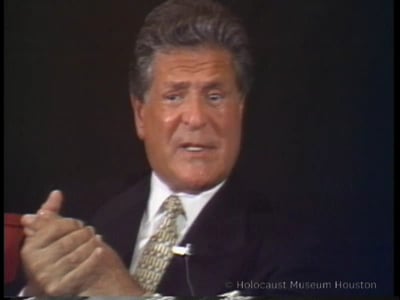Growing up in Łódź, Poland, Walter Kase, the first child of loving and well-to-do parents, was not bothered by antisemitism. “I always had boys, Jewish and non-Jewish, playing soccer and volleyball [with me]. I never worried about discrimination. I didn’t know of any discrimination at the time.”
When Germany invaded Poland in September 1939, Walter’s family assumed the war would be a temporary “inconvenience.” But it soon became clear that their lives would never be the same again. At the end of 1940, Walter, his parents and his younger sister Rysia were herded into a Jewish ghetto. One day in 1941, the ghetto residents were told to gather in the city square. There, in front of her family, Rysia was lined up with other young children and shot to death.
Twelve-year-old Walter was sent with his father to the labor camp of Pionki, later to Auschwitz and Sosnowiec, and finally to Mauthausen and two of its subcamps. Public hangings and wanton brutality terrified Walter, lice and hunger plagued him and forced labor exhausted him, but one of the most painful things Walter faced was the realization that his father was fallible. “I thought my father was indestructible, that he was Superman [but] things got so bad . . . that I was the support of my father, yet I was 12 years old and the person that I believed in so strong was falling apart on me.”
In 1945, Walter and his father were marched to Gunskirchen, a sub-camp of Mauthausen. By then, he said, the Nazis were no longer bothering to murder the inmates—they were simply letting the starving, ill and filthy prisoners die on their own. When they were finally liberated by the 71st Infantry Division of the United States Army in May 1945, Walter’s father hovered near death. Taken to a hospital to recuperate, Walter regained his strength, but his father succumbed a month later. At 14, Walter found himself utterly alone.
Walter made his way back to Poland where he was reunited with his mother. Together they left for Germany and lived in a camp for displaced persons. In 1947, Walter came to the United States with a group of war orphans, settling in Kansas City, Missouri. There he finished his schooling, started a career in sales and married Lila Greenstein. Two months after his wedding, Walter was drafted and served proudly during the Korean War. He and his wife had two children, Kenny and Risha, named in memory of Walter’s sister. Walter was able to bring his mother to the United States, where she settled in Washington, D.C.
Divorced from Lila in 1975, Walter married Chris Oshman the following year. The couple lived in Houston where Walter established a successful import business. He remained active in Jewish causes, sitting on the boards of the Anti-Defamation League and Holocaust Museum Houston. A gifted speaker, Walter gave more than one thousand talks about the Holocaust and was particularly gratified when a student told him she believed he had survived so he could “connect” to others by discussing his experiences. The Anti-Defamation League established a Teachers’ Award in Walter’s name and he was the first recipient of the St. Augustine Award from St. Thomas University in recognition of his life-changing impact on others.
Parents
Chaim Kasrylewicz, d. Wels, Austria, 1945
Evelyn Rosencrantz Kasrylewicz, survived
Siblings
Rysia, d. Łódź, 1941
